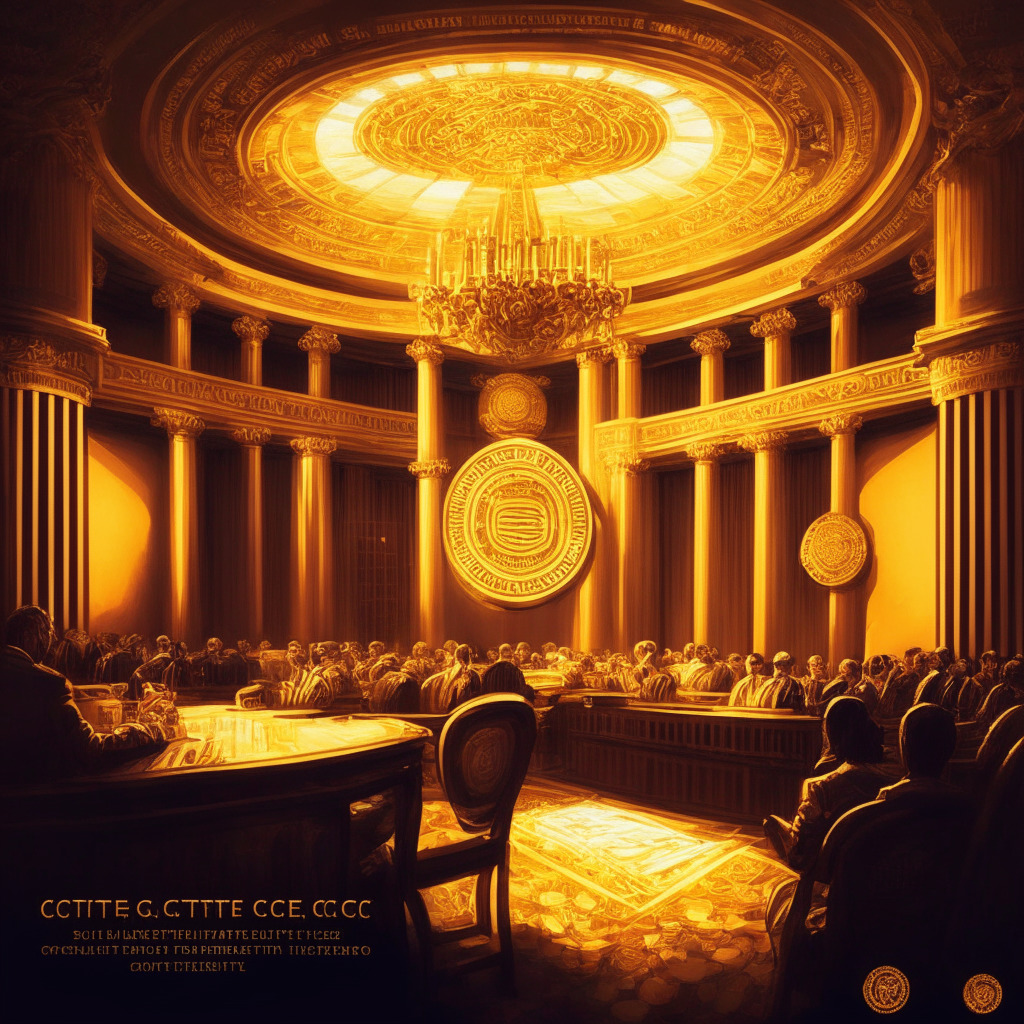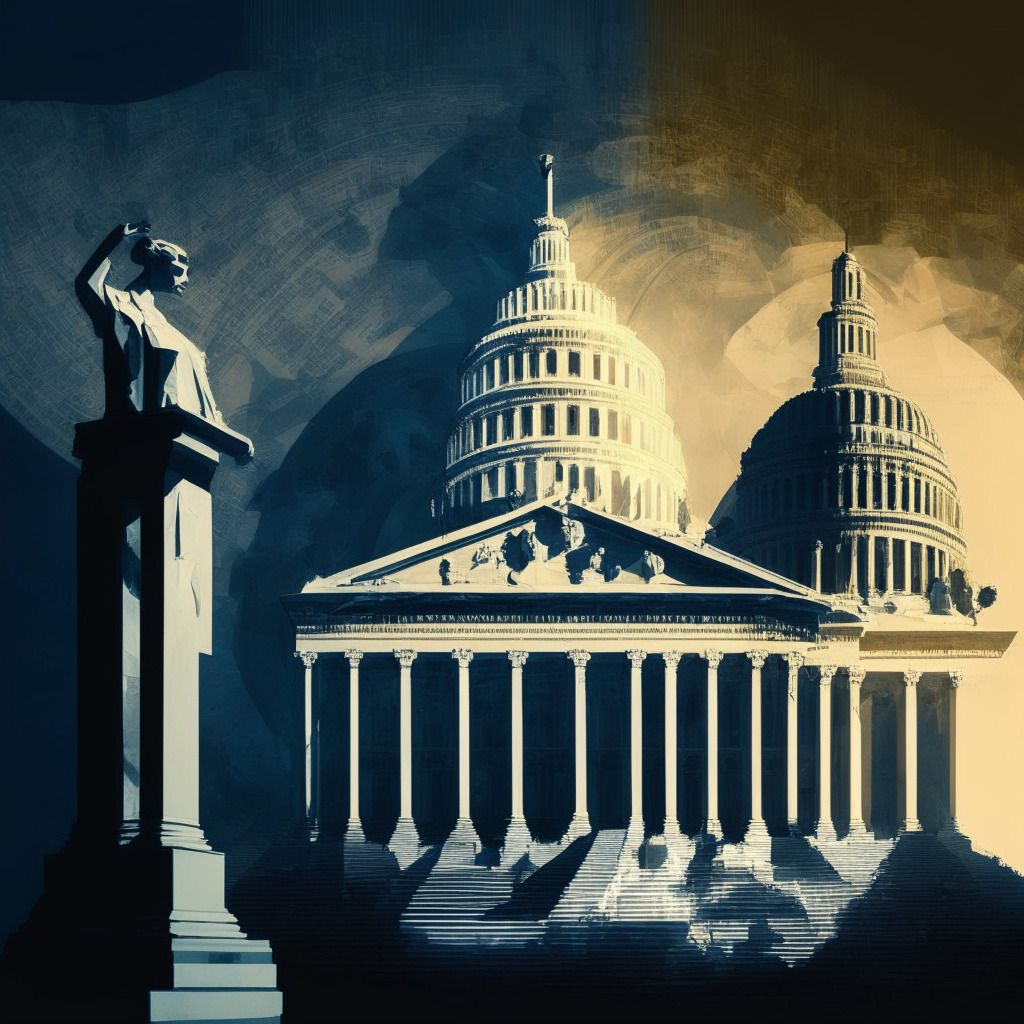Crypto startup Prometheum gains attention as the first crypto-centric broker-dealer registered with the SEC and a member of FINRA. Despite controversy, the firm’s regulatory status may provide insights into the SEC’s perspective on digital asset compliance, impacting future crypto startups seeking regulation.
Search Results for: Financial Services Committee
Prometheum’s SEC Approval Sparks Debate: Merit or Insider Bias?
The SEC and FINRA-approved crypto firm Prometheum has stirred up discussions within the community due to its lack of trading in top crypto assets. Prometheum’s regulatory approval raises questions about the future of digital assets, established regulatory frameworks, and blockchain technology’s role in the rapidly evolving landscape.
SEC’s Controversial Rule Sparks Debate: Impact on Digital Asset Industry and Struggle for Balance
A group of Republican lawmakers criticized a proposed SEC rule, arguing it could shut down the digital asset industry’s development. They expressed concerns that the rule, potentially expanding the definition of an exchange, would capture various individuals, including software developers and blockchain network participants. The controversy highlights the growing consensus on the necessity of a clear legal framework within the cryptocurrency space.
Urgent Need for Crypto Regulations: Debating the Pros, Cons, and Conflicts
A Congressional hearing discussed the Digital Asset Market Structure Discussion Draft, aiming to establish a regulatory framework for digital assets. The industry seeks regulatory clarity amid concerns that insufficient action could have “devastating consequences” for the U.S.’s global digital economy competitiveness.
Navigating the Turbulent Waters of Crypto Regulation: Challenges and Prospects
Congress’ latest proposed crypto bill seeks to resolve the “haphazard, schizophrenic” ways of regulators addressing significant industry players. The bill faces challenges in securing passage and has received mixed reactions from policymakers. However, the bipartisan nature of the issue provides hope for progress in clarifying regulatory expectations.
Binance & Binance.US Battle SEC Lawsuit: The Fate of Crypto Regulations and Industry
Binance and Binance.US face the SEC in court over a proposed temporary restraining order, which they claim could threaten their businesses’ survival. Meanwhile, Ripple’s ongoing SEC lawsuit offers insights into the regulator’s deliberative process. The outcomes of these cases will significantly influence the future of cryptocurrency regulations and the industry’s landscape.
Balancing Privacy and Transparency: Pros and Cons of a US Central Bank Digital Currency
The U.S. Treasury Department explores Privacy Enhancing Technologies (PETs) to protect privacy and anonymity in potential digital dollar transactions. As the U.S. considers introducing a Central Bank Digital Currency (CBDC), addressing risks and striking a balance between privacy and transparency remain top priorities for policymakers.
Urgency for US Stablecoin Bill: Balancing Innovation and Regulation in Digital Currency Future
Circle’s CEO Jeremy Allaire urges US lawmakers to prioritize a stablecoin bill amid global advancements in digital currency regulations. The bill, titled “The Future of Digital Assets”, aims to foster a vibrant and safe digital assets market while balancing innovation and financial stability.
Landmark Bill on Crypto Tokens Exemption: Boon or Bane for Securities Laws and Investors?
The McHenry-Thompson draft bill aims to exempt cryptocurrency tokens from securities laws by creating a new asset class labeled “digital assets.” While it gains attention and support, the bill raises concerns regarding regulatory arbitrage and presents challenges reconciling the crypto industry’s goals with existing legislation, causing uncertainties for companies and investors.
Balancing Blockchain Innovation and Regulation: Nurturing Growth or Inviting Disaster?
Emin Gün Sirer, CEA of Ava Labs, urges the U.S. to “nurture” and “support” responsible blockchain innovation to avoid “disastrous consequences.” Blockchain technology has the potential to transform digital services and the economy, but striking a balance between innovation and safety remains a challenge.
Navigating Crypto’s Regulatory Tightrope: Balancing Community and Compliance
In the face of increased regulatory scrutiny, Binance’s VP of Marketing, Rachel Conlan, emphasizes the importance of supporting the crypto community while acknowledging the need for regulations. As the industry potentially faces legislative changes, fostering community and adapting to a regulated environment are crucial for its future.
Stablecoin Bill: Federal vs State Regulation and Impact on Digital Asset Ecosystem
The third draft of the new stablecoin bill, “The Future of Digital Assets: Providing Clarity for the Digital Asset Ecosystem,” proposes the Federal Reserve as the key regulator for stablecoins. The bipartisan bill aims to offer comprehensive guidance on supervising and enforcing stablecoin markets, covering aspects like issuer requirements and payment stablecoins.
SEC Lawsuits, FTX Bankruptcy, and BitGo Acquisition: Market Impact on Bitcoin and Ethereum
Bitcoin and Ethereum face significant developments impacting price predictions due to the US SEC lawsuit, bankruptcy of FTX exchange, and BitGo’s acquisition deal. As clear regulation and reliable custody services are crucial, cryptocurrency prices remain sensitive to market changes.
SEC Crackdown on Crypto Exchanges: Decentralized Finance Surges and Market Uncertainty Grows
The cryptocurrency market is facing increased uncertainty due to recent regulatory actions by the SEC against Binance and Coinbase. Consequent to crackdown on centralized exchanges, DeFi sector sees rapid growth. Investors keep a close eye on upcoming hearings and future developments as market adapts to regulatory challenges.
Blockchain Innovation & Regulation: Striking the Balance for US Leadership in Web3
The House Energy and Commerce Committee Subcommittee discussed blockchain technology and the future of Web3, addressing non-financial use cases such as contract tracing for Covid-19, data security, and supply chain management. However, lack of regulatory clarity and the focus on financial applications pose challenges to fostering innovation and retaining top talent in the US.
AI vs. Human Governance: Debating Regulatory Efforts and Crypto Restrictions Worldwide
AI experts sign an open statement highlighting the need for mitigating extinction risks from AI, as global regulatory efforts increase. Binance restricts privacy tokens trading in four European countries, while the MiCA cryptocurrency regulatory framework is signed into law.
Digital Assets Debate: Clarifying Security vs Commodity and the Impact on Crypto Regulations
The proposed draft legislation aims to clarify the distinction between a security and a commodity in the digital asset space, establishing when they should be regulated by the SEC or CFTC. This legislation promises to bring clarity and transparency, ensuring future stability and success for the financial sector.
Countdown to Clarity: Hinman Speech, Crypto Hearings and the Future of Digital Assets
The crypto community eagerly awaits key hearings discussing the future of digital assets and potential regulations. These hearings carry significant weight for investors, as their outcomes can shape the entire crypto market, either propelling it forward or hindering its progress.
Digital Asset Regulation: Bridging the Divide Between CFTC and SEC in Upcoming Congressional Hearing
US lawmakers will discuss “The Future of Digital Assets: Providing Clarity for Digital Asset Spot Markets” in a congressional hearing on June 6. Collaboration between regulatory committees like the CFTC and SEC is essential to address concerns in the digital assets space, focusing on effective guidelines and fostering innovation while safeguarding consumer interests.
Securities Clarity Act: Resolving Legal Questions and Shaping Crypto’s Future in the U.S.
The Securities Clarity Act, a newly introduced bill, aims to clarify that digital assets in “investment contracts” won’t be considered securities. If passed, it could resolve a heavily debated legal question and make it harder for the SEC to claim that various tokens are unregistered securities.
Freedom to Transact as Vital as Expression: Politicians Weigh In on Bitcoin’s Role and Risks
Democratic presidential candidate Robert F. Kennedy Jr. speaks at the Bitcoin 2023 conference, equating the freedom to transact with freedom of expression. Emphasizing Bitcoin’s importance, Kennedy highlights its role as a bulwark against governmental and corporate intrusion, while advocating for citizens’ rights to hold and use Bitcoin and opposing invasive cryptocurrency regulations.
Biden’s 30% Crypto Mining Tax: Innovation Killer or Eco-Friendly Move? Pros & Cons Explored
Senator Cynthia Lummis opposes the proposed 30% tax on cryptocurrency miners in the Biden Administration’s budget for 2024, citing environmental benefits. The proposed tax has sparked debates surrounding innovation, blockchain development, and consumer protection, with concerns it may hinder cryptocurrency adoption in the US.
Tether’s 15% Bitcoin Investment: Pros, Cons, and Future of Stablecoin Regulation
Tether plans to invest 15% of its net profits in Bitcoin to strengthen and diversify its reserves, demonstrating the company’s confidence in the cryptocurrency market. As US lawmakers discuss potential stablecoin legislation, Tether’s bold move could potentially shape the future of the industry.
SEC’s LBRY Lawsuit: Protecting Investors or Hindering Crypto Innovation?
The SEC recently modified the penalty in the LBRY lawsuit, attracting criticism for not protecting individual investors. Though fines were reduced due to LBRY’s inability to pay, questions arise about the regulatory approach’s fairness and effectiveness for cryptocurrencies, highlighting the struggle to balance investor protection and market innovation.
SEC’s Proposed Custody Rule Faces Backlash: Analyzing Impacts on Crypto Industry & Investor Security
The SEC’s proposed custody rule faces criticism from industry players and officials, citing overreaching authority, potential advisor inhibition, and investor asset security risks. Amidst concerns, clearer regulatory frameworks are needed to balance market stability with innovation in the crypto landscape.
Major Questions Doctrine: Friend or Foe in Crypto Regulation Battle?
The major questions doctrine, a legal principle in U.S. administrative law, could potentially diminish the SEC’s authority in regulating the cryptocurrency industry. Kraken’s Chief Legal Officer, Marco Santori, believes this concept is relevant as lawmakers deliberate on cryptocurrency regulations and should be considered by the SEC and CFTC.
US
The US is considering adopting Europe’s cryptocurrency regulation model, MiCA, for increased transparency, security, and consumer protection. However, concerns about privacy, personal freedom, and stifling innovation must be balanced in this evolving regulatory landscape.
Bipartisan Rift Emerges on Stablecoin Bill: Consumer Protection vs State Regulation
House Democrats are considering a separate stablecoin bill, highlighting a rift with the parallel Republican effort. Addressing stablecoins is a key priority for US lawmakers overseeing crypto operations. The Democratic bill focuses on consumer protection, granting the Federal Reserve veto power over issuer registration, while the Republican version empowers states to regulate issuers.
Coinbase’s Global Advisory Council: Navigating Crypto Regulations with Former US Lawmakers
Coinbase launches its Global Advisory Council, including former US lawmakers Patrick Toomey, Tim Ryan, and Patrick Maloney, to navigate crypto regulations. The council aims to collaborate with regulators, shaping the future of cryptocurrency and bridging the gap between regulators and innovators.
Paradigm Backs Coinbase in Legal Battle Against SEC: The Fight for Clear Crypto Regulations
Paradigm, a leading crypto investment firm, has filed a petition to support Coinbase’s legal case against the SEC, highlighting the urgent need for transparent guidelines and a regulatory framework for crypto firms operating within the United States. The ongoing legal dispute raises concerns about a potential de facto ban on digital asset trading platforms and regulatory uncertainty in the industry.
SEC & Congress Clash: Crypto Platforms Registration, Balancing Regulation & Innovation
The SEC faces challenges in crafting digital asset regulations that protect investors without stifling innovation. Lawmakers express frustration over the regulatory body’s lack of clarity, while the future role of the SEC and Congress in shaping crypto regulations remains uncertain.
Allegations of SEC’s Selective Enforcement: Unveiling Conflicts in Crypto Market Regulation
EMPOWR filed a complaint against the SEC alleging selective enforcement on crypto market businesses and potential conflicts of interest among high-level officials. This follows the SEC’s failure to comply with a Freedom of Information Act request, further highlighting the agency’s inability to provide clear regulations and transparency for the growing crypto industry.































